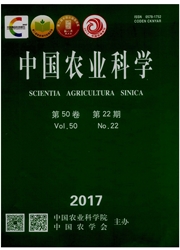

 中文摘要:
中文摘要:
人类活动影响气候变化的一个重要因素是土地利用的变化,尤其是农业土地利用与管理。在中国面对全球气候变化形势的巨大压力的背景下,研究农业土地利用管理与土壤碳汇的关系,探讨农业土地利用管理对土壤固碳减排的影响,对提高我国农业土壤固碳减排潜力具有一定作用。利用国内外文献资料,分析了中国农业土地利用管理对土壤碳汇功能及其土壤固碳减排潜力的影响。结果表明,国内外大量研究显示,农业不仅是温室气体的主要排放源之一,同时也可能是温室气体的吸收汇。改善和调整农业土地利用管理方式,可以进一步增加农业土壤碳汇,如近20年,由于中国农业土壤管理的改善,农地土壤呈现碳增汇趋势。基于中国农业土地利用管理下的土壤碳汇潜力估算,尤其是推行优化管理措施下(如增加秸秆还田、有机肥施用、少免耕技术等),未来50年中国农业土壤固碳减排潜力约为87—393 TgC.a-1,相当抵消中国工业温室气体排放总量的11%—52%,其中实施农田管理措施(包括有机肥应用、秸秆还田、保护性耕作)对土壤固碳的贡献率约为30%—36%(相当抵消工业温室气体排放3.4%—19%)。研究表明,中国农业土地利用管理(如实施秸秆还田、有机肥施用、少免耕技术等农田管理措施)在固碳减排中的作用及其潜力不可忽视。
 英文摘要:
英文摘要:
Changes in land use,especially in cropland-use management,induced by human activities is one of the most important factors influencing climate change.In China,facing the huge pressure of dealing with climate change,the research on the relations between cropland-use management and soil carbon(C) sink,and the effects of cropland-use management on soil C sequestration and C emission mitigation is important,aiming at providing a decision-making basis for improvement of soil C sequestration and C emission mitigation in China.Through the literature reviews,this paper analyzes the impact of cropland-use management on soil C sequestration and C emission mitigation in China.As literature reviewed,agriculture is not only a main source of C emission,but also a sink of C sequestration.Through improvement of cropland-use management(such as increasing straw return into the soil,organic fertilizer application,and no-till/reduced tillage practices,etc.),there has shown an increasing trend in soil C sink in cropland since the last 20 years.Based on the estimation of soil C sequestration in cropland in China,especially with the recommended management practices,especially in the future 50 years,the potential for soil C sequestration in cropland of China is estimated about 87-393 TgC·a-1,thus offsetting about 11%-52% of the total industry C emissions,in which improved cropland-use management(including straw return,organic fertilizer application,and no-till/reduced tillage) could share about 30%-36% of C sequestration.This shows that cropland-use management in China could play an important role in soil C sequestration and C emission mitigation.
 同期刊论文项目
同期刊论文项目
 同项目期刊论文
同项目期刊论文
 期刊信息
期刊信息
